|
Size: 4923
Comment:
|
Size: 6787
Comment:
|
| Deletions are marked like this. | Additions are marked like this. |
| Line 9: | Line 9: |
| || USB Stick || '''~/thindrives''' || | || [[thinlinc#USB_sticks:_Terminals_in_building_Y27|USB Stick]] || '''~/thindrives''' || || [[thinlinc#Copy_files_from.2Fto_the_Thinlinc_Session|Local files]] || '''~/thindrives''' || |
| Line 11: | Line 12: |
| || [[#Keyboard_Layout|Keyboard Layout]] || The keyboard will be automatically detected during log in. If you need special characters, the easiest way is to use the 'Compose Key' || | |
| Line 12: | Line 14: |
| = General = * Advantages of Thinlinc against 'Sun Ray': * Supports latest Linux OS natively. * This is the main reason for the migration. * Much better grafic speed: * Smoother scrolling on websites. * Playing Videos. * Much better '''USB stick''' support. |
|
| Line 23: | Line 17: |
| * Disadvantage * 'power on' takes longer. * Sound problems after reconnecting the session: Start the application again (for webbrowsers: reload the webpage) or disconnect and reconnect again. * '''Smart Card''': at the moment not enabled. = Usage = == Connect Session == * Just login. An already existing session (on another terminal) will be moved and reconnect to the new terminal. |
= Connect Session = * Use any of the Terminals at the institute or use the 'native client' (see below) application on your own computer (Internet access is needed). * Just login. * An already existing session (in the background or on another terminal) will be moved and reconnect you. |
| Line 33: | Line 23: |
| * By default the Session is '''fullscreen'''. To change this, open the 'popup menu' by pressing F8 and change '''Full screen'''. | |
| Line 34: | Line 25: |
| == Disconnect Session == | = Disconnect Session = |
| Line 38: | Line 29: |
| == USB Sticks / external Harddrive, CDROM == * Plugged in USB sticks, ext. Harddrives and CDROM will appear in your homedirectory under the folder '''thindrives'''. * Using the USB port at the Keyboard: not all USB stick will be recognized - use one of the USB ports located directly at the terminal. * Mount and unmount happens automatically. * If you copy data on it, wait until the light on the USB stick stops flashing, plus additional 10 seconds. After that, it's secure to remove the stick. |
= USB sticks: Terminals in building Y27 = * If you plug in a USB Stick at the terminal, there is '''no window''', which opens automatically. * Plugged in USB sticks or ext. Harddrives will appear in your home-directory under the folder '''thindrives'''. * Open a Filemanager (Menu: Places) and navigate to your 'home directory > thindrives'. * Mount and unmount happens automatically - wait a few seconds. * If you copy data, wait until the light on the USB stick '''stops''' flashing or the '''progress bar''' disappear, plus some additional seconds. After that, it's secure to remove the stick. * If the stick does not appear under directory '~/thindrives', please trigger a remount via menu '''Applications > System Tools > Clean USB Stick umount/mount'''. |
| Line 44: | Line 37: |
| == Burning CDs & DVDs == * Not possible with the terminal. |
= Remote Access: thinlinc@home = |
| Line 47: | Line 39: |
| == Local: Terminals at the institute == * Login with your regular I-MATH account. |
== By webbrowser == * https://tl.math.uzh.ch * No sound. * No local drives * For touch based devices (Tablets), you'll find a software keyboard on the top of the window, |
| Line 50: | Line 45: |
| == Remote: using the native client (Linux, Windows, Mac) from outside the institute - thinlinc@home == === Native Client === * Install the native Client (Linux, Windows, Mac): * Download: [[attachment:setup.thinlinc.4.0.imath.exe|Windows (I-MATH customized version)]] [[http://www.cendio.com/downloads/clients/|Linux & Mac]] * At the moment, there is no Android or iOS Support. * Start the native client `tlclient` (it's a standalone application, it's not a browser version) * Servername: {{{ |
== By native client == * Install the native Client (Linux, Windows, Mac): [[http://www.cendio.com/downloads/clients/|Windows, Linux & Mac]] * At the moment, there is no native Android, Windows Phone or iOS support. Use the webclient instead. * Start the native client and connect to: {{{ |
| Line 63: | Line 54: |
| * It's possible that you have to accept the '''hostkey''': press 'Continue' {{attachment:hostkey.png}} |
|
| Line 64: | Line 57: |
| * It's possible that you have to accept the hostkey: press 'Continue' {{attachment:hostkey.png}} * Pressing 'F8' opens a menu, with options for: |
* '''Disconnect''' / toggle '''Full screen''': Pressing 'F8' opens a menu, with options for: |
| Line 69: | Line 60: |
| * Never logout, just disconnect. | |
| Line 71: | Line 61: |
| === Screen Size === * After starting the `tlclient` choose under `Options > Screen` your desired screen size. |
* Best practice: it's not necessary to logout, just disconnect. |
| Line 74: | Line 63: |
| === Local printing === * Not configured at the moment. |
= Printing = * Using institutes printer: ok * Using printer at home: * Not configured at the moment (never requested, please contact [[http://math.uzh.ch/support|Support]]) * Workaround: copy the file to a mapped directory under `~/thindrives`. Access the file locally and print it from there. |
| Line 77: | Line 69: |
| === Access local files === * Before connecting to to thinlinc session, configure the directories to be connected between the local computer and the thinlinc session: * 'tlclient' > Options > Local Devices > * Drives: checked * Drives - Details > * Add * Exported Path: <the path of your local directory> * Permission: Read Only or Read Write (as you wish). * After any change, best is to close 'tlcient' and start it again. 'tlclient' always saves your last settings. * You'll find the local exported filesystem inside your thinlinc session under `~/thindrives`. |
= Copy files from/to the Thinlinc Session = * This is is very similar as with the USB sticks above. * Add a mapping of local directories to the '''~/thindrives''' directory inside the thinlinc session. * Do the mapping, before you connect to the session: 1. Open the 'Thinlinc Client' and choose '''Options > Local Devices > Drives: Details''' 2. Add a new directory and set '''permissions'''. 3. If there are '''troubles''' with a mapped directory: choose inside the thinlinc session the menu '''Applications > System Tools > Clean USB Stick umount/mount'''. {{attachment:thinlinc.options.local.drives.png}} {{attachment:thinlinc.export.local.png}} {{attachment:thinlinc.select.png}} |
| Line 90: | Line 81: |
| * While using the terminals at the institute, the keyboard layout should be detected automatically. * On the left-bottom-corner of the login screen, you are free to choose another keyboard layout. This setting is only valid until session disconnects. * Typically, it's not practible to change the Keyboard layout every time you connect your session. * The best solution to type characters which are not directly accessible on the keyboard, is by using the 'compose key' - please check [[ComposeKey]]. |
* If you like to use a keyboard with a different layout than already installed in your office, please contact [[http://math.uzh.ch/support|Support]]. * '''Automatic layout detection''': While using the terminals at the institute, the keyboard layout should be detected automatically, regarding the connected keyboard type. * An efficient and fast solution, to type characters, which are not directly accessible on the keyboard, is by using the 'compose key' - please check [[ComposeKey]]. * '''Manual selected keyboard layout''': * This setting is only valid until session disconnects. * It's boring to change the keyboard layout every time you connect your session - unfortunately, there's no solution at the moment to make the 'manual selected keyboard layout' permanent. * '''Before log in''': on the left-bottom-corner of the '''login''' screen, you are free to choose another keyboard layout. * '''After log in''': If you want to change the keyboard layout on the fly (session is active): * Press 'F8' * Disable 'Fullscreen' * Then you'll see the icon of the 'keyboard layout switcher' in the lower left corner of the screen: click on it to open the 'keyboard layout switcher' * Select your favorite layout. * If you like, activate 'fullscreen' again by pressing 'F8' again and active 'Fullscreen'. * Website to convert keystokes to specific languages: http://www.typeit.org/ = Skype = * Voice, chat and screen sharing are supported. * Webcams are not supported. * You can borrow a headset from [[http://math.uzh.ch/support|Support]]. = Audio = * For using 'headphones', please check if there is a 3.5mm jack at your monitor (varies with the models). * If you do not find a connector, you can get a USB/Audio converter form [[http://math.uzh.ch/support|Support]]. Plug the converter in the terminal. |
Thinlinc: Terminal Server Environment
Contents
Cheat Sheet
Action |
Note |
Disconnect Session |
Press 'F8' > 'Disconnect ' |
Screen Lock |
Activate: Ctrl - Alt - L, |
~/thindrives |
|
~/thindrives |
|
Screen Size |
Press 'F8' > 'Fullscreen: Disable' to make a fullscreen Window resizable. |
The keyboard will be automatically detected during log in. If you need special characters, the easiest way is to use the 'Compose Key' |
Accessing the same session locally (at the institute) and remotely (for example at home) - no hassle anymore with locked Firefox profiles.
IT Support: on your request, it's possible to 'shadow' your session to the IT group - in case of any trouble - just call the IT by phone.
Connect Session
- Use any of the Terminals at the institute or use the 'native client' (see below) application on your own computer (Internet access is needed).
- Just login.
- An already existing session (in the background or on another terminal) will be moved and reconnect you.
Server: tl.math.uzh.ch
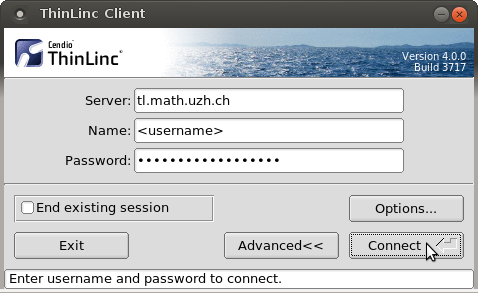
By default the Session is fullscreen. To change this, open the 'popup menu' by pressing F8 and change Full screen.
Disconnect Session
Press F8 to open 'popup menu' and choose disconnect.
If you need the 'F8 key' in an application, assign another key for the popup menu. To do so: F8 > Options > Options > Popup Menu Key. The new setting is only active during the recent connected session.
USB sticks: Terminals in building Y27
If you plug in a USB Stick at the terminal, there is no window, which opens automatically.
Plugged in USB sticks or ext. Harddrives will appear in your home-directory under the folder thindrives.
Open a Filemanager (Menu: Places) and navigate to your 'home directory > thindrives'.
- Mount and unmount happens automatically - wait a few seconds.
If you copy data, wait until the light on the USB stick stops flashing or the progress bar disappear, plus some additional seconds. After that, it's secure to remove the stick.
If the stick does not appear under directory '~/thindrives', please trigger a remount via menu Applications > System Tools > Clean USB Stick umount/mount.
Remote Access: thinlinc@home
By webbrowser
- No sound.
- No local drives
- For touch based devices (Tablets), you'll find a software keyboard on the top of the window,
By native client
Install the native Client (Linux, Windows, Mac): Windows, Linux & Mac
- At the moment, there is no native Android, Windows Phone or iOS support. Use the webclient instead.
Start the native client and connect to:
tl.math.uzh.ch
- Be aware, the second character of the servername is a lowercase 'L'!
- Username / Password: as your I-MATH Account.
It's possible that you have to accept the hostkey: press 'Continue'
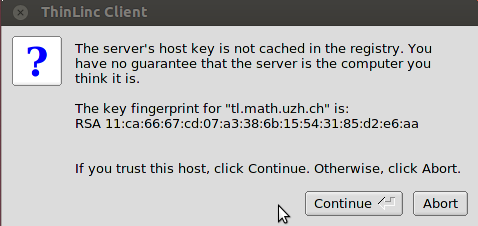
Disconnect / toggle Full screen: Pressing 'F8' opens a menu, with options for:
Disconnect.
changing Full Screen.
- Best practice: it's not necessary to logout, just disconnect.
Printing
- Using institutes printer: ok
- Using printer at home:
Not configured at the moment (never requested, please contact Support)
Workaround: copy the file to a mapped directory under ~/thindrives. Access the file locally and print it from there.
Copy files from/to the Thinlinc Session
- This is is very similar as with the USB sticks above.
Add a mapping of local directories to the ~/thindrives directory inside the thinlinc session.
- Do the mapping, before you connect to the session:
Open the 'Thinlinc Client' and choose Options > Local Devices > Drives: Details
Add a new directory and set permissions.
If there are troubles with a mapped directory: choose inside the thinlinc session the menu Applications > System Tools > Clean USB Stick umount/mount.
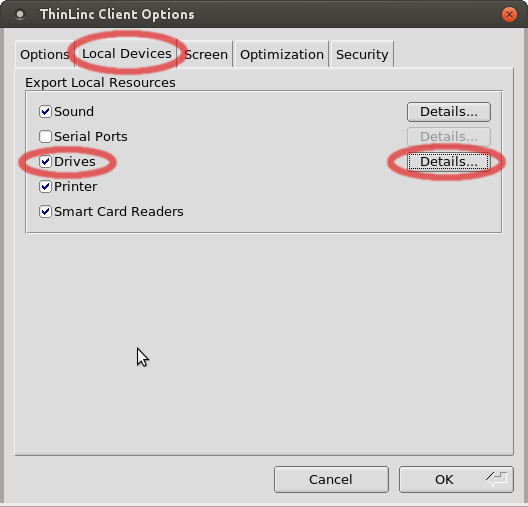
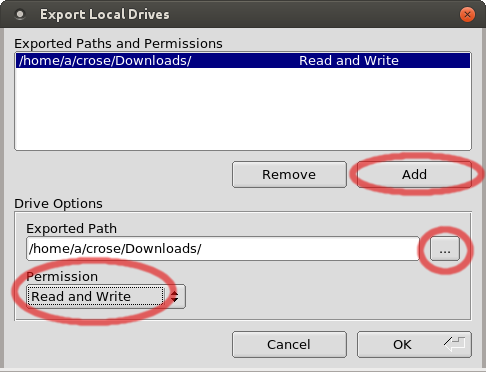
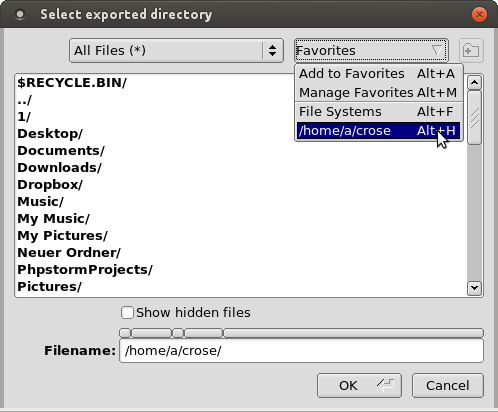
Keyboard Layout
If you like to use a keyboard with a different layout than already installed in your office, please contact Support.
Automatic layout detection: While using the terminals at the institute, the keyboard layout should be detected automatically, regarding the connected keyboard type.
An efficient and fast solution, to type characters, which are not directly accessible on the keyboard, is by using the 'compose key' - please check ComposeKey.
Manual selected keyboard layout:
- This setting is only valid until session disconnects.
- It's boring to change the keyboard layout every time you connect your session - unfortunately, there's no solution at the moment to make the 'manual selected keyboard layout' permanent.
Before log in: on the left-bottom-corner of the login screen, you are free to choose another keyboard layout.
After log in: If you want to change the keyboard layout on the fly (session is active):
- Press 'F8'
- Disable 'Fullscreen'
- Then you'll see the icon of the 'keyboard layout switcher' in the lower left corner of the screen: click on it to open the 'keyboard layout switcher'
- Select your favorite layout.
- If you like, activate 'fullscreen' again by pressing 'F8' again and active 'Fullscreen'.
- This setting is only valid until session disconnects.
Website to convert keystokes to specific languages: http://www.typeit.org/
Skype
- Voice, chat and screen sharing are supported.
- Webcams are not supported.
You can borrow a headset from Support.
Audio
- For using 'headphones', please check if there is a 3.5mm jack at your monitor (varies with the models).
If you do not find a connector, you can get a USB/Audio converter form Support. Plug the converter in the terminal.
